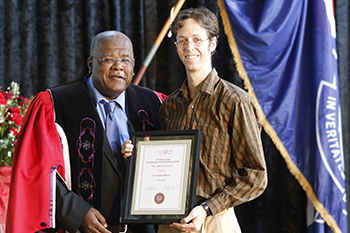Latest News Archive
Please select Category, Year, and then Month to display items
25 March 2024
|
Story Anthony Mthembu
|
Photo Lutendo Mabata
 Prof Nompumelelo Zondi, the newly appointed Vice-Dean: Research and Postgraduate Studies in the Faculty of The Humanities at the University of the Free State (UFS).
Prof Nompumelelo Zondi, the newly appointed Vice-Dean: Research and Postgraduate Studies in the Faculty of The Humanities at the University of the Free State (UFS).
Prof Nompumelelo Zondi has been appointed as Vice-Dean: Research and Postgraduate Studies in the Faculty of The Humanities at the University of the Free State (UFS). Prof Zondi assumed this new role on 1 March 2024 after serving as the Head of Department for African Languages at the University of Pretoria for seven years. “I consider this appointment as an opportunity of growth and learning more about higher education and the Faculty of The Humanities at large,” she said.
Prof Zondi indicates that part of her role is to spearhead the UFS Vision130 within the Faculty of The Humanities, and to ensure that the faculty assists the institution in becoming research-led, student-centred, and globally impactful.
Motivation for assuming this role
One of the primary reasons that led her to consider this role is sharing the knowledge she acquired as part of the Fulbright South African Research Scholar Programme. As a result of that experience and exposure, which went beyond the Ohio State University, she felt it befitting to implement some of the insights she acquired on a bigger scale. Therefore, even though she was impactful in her previous role, Prof Zondi believes that this is an exceptional and more desirable platform to do so. “I feel that I will have easier access to departments within the faculty, while also encouraging and supporting interdepartmental and faculty collaborations,” she explained.
A significant component of Vision 130
He believes that the elements that make up Vision 130 are interrelated. While she considers research central to Vision 130 – as she begins her journey at the UFS, she feels students deserve to be nurtured to further contribute to the university’s impactful research. Thus, student-centredness is the way to go. “I believe that students must be major role players in this Vision130; we must include them in the interactions and discussions that are part of the university’s strategic plan as well as in decision-making processes,” she said. As such, according to Prof Zondi, the more the faculty and the institution care for the students and involve them in Vision130 and in collaborations, the more research outputs the university will achieve.
Book Prize for Distinguished Scholarship awarded to Dr Christian Williams
2016-03-24

Prof Jonathan Jansen, Vice-Chancellor and Rector of the University of the Free State and Dr Christian Williams, senior lecturer at the UFS Department of Anthropology.
Photo: Johan Roux |
When Dr Christian Williams moved from the United States to Namibia in January 2000 as part of the WorldTeach volunteer programme for teachers, he had not anticipated an award-winning piece of scholarship in his future. It was during these visits to Namibia, though, that the seeds for his highly-acclaimed book were sewn.
While volunteering at the St. Therese Secondary School in Tses at that time, Dr Williams – now a senior lecturer at the University of the Free State (UFS) Department of Anthropology – became acquainted with some of the school’s alumni. The stories these individuals started sharing with him soon revealed personal histories of exile and violence by fellow SWAPO (South West Africa People’s Organization) members.
These experiences ultimately resulted in Dr Williams’ book, National liberation in postcolonial southern Africa: a historical ethnography of SWAPO’s exile camps, published last year. Due to the book’s literary impact, the university awarded Dr Williams the UFS Book Prize for Distinguished Scholarship on Friday 19 February 2016. Dr Williams is the second academic to be awarded this prize.
Politics of the past
In the 1960s, Namibians mobilised and retaliated against colonial rule under the liberation movement known as SWAPO. This created political tension which resulted in the flight of many SWAPO members to exile camps administered by the party.
“Over its three decades in exile, SWAPO was responsible for the welfare of roughly 60 000 Namibians. This was about 4% of the total Namibian population at independence – most of whom lived in camps,” says Dr Williams. The research originally used as a basis for his doctoral thesis was subsequently developed into this prize-winning book.
Advancing the Human Project
“It’s an honour to receive recognition from the university; it means that they value the kind of work that I am doing. I think it’s great for universities to have such prizes,” Dr Williams says.
Supporting the UFS Human Project, Dr Williams will donate a portion of the R25 000 prize money towards the UFS Student Bursary Fund Campaign, as well as the school in Namibia.The rest will subsidise the purchase of the book for distribution to libraries and as gifts.